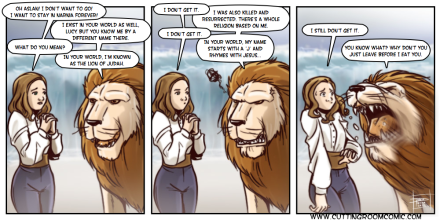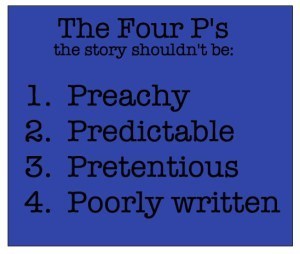Nate Fleming's Blog, page 41
May 21, 2014
Noah, The Biblical Story, and Stuff Christians Fight About
A great article on how we should approach Aronofsky’s Noah. Great job, Stephen!
 Originally posted on Panic, preacher. Panic!:
Originally posted on Panic, preacher. Panic!:
I don’t usually blog about controversial topics, but I’ve seen so much about this and I have some thoughts, so I figured I would get them out. I think many (not all) of the issues some of my fellow Christians have about the new Noah film are much more telling about a problematic understanding of scripture within the modern day Church than about some evil, maniacal filmmaker twirling his mustache and trying to dismantle Christianity as we know it.
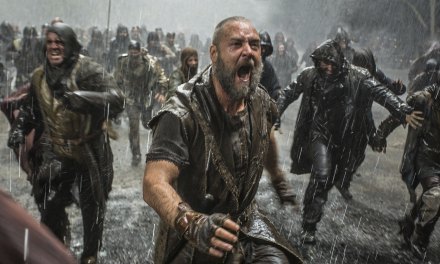
It’s not as if the book of Genesis is the sole intellectual property of Christians and it’s also not as if the movie (or any of the press surrounding it) ever states that it is intended to be an accurate representation of the biblical story. It’s exactly what it’s marketed as, a big budget action film loosely based on the story of Noah. I mean, would so many Christians freak out…
View original 756 more words


A Hard Word from Elisabeth Elliot
This morning, Elisabeth Elliot was on my mind. I hadn’t thought about Mrs. Elliot in years, and while I’ve since moved overseas and left my library behind, there was a time when her books were on my shelf, displayed prominently. Through Gates of Splendor, Passion and Purity, A Chance to Die... these were books that I read and re-read. I have a funny story that has to do with Mrs. Elliot, me, and a Kermit the frog pez, but I’ll save that story for later. For now… a hard word.
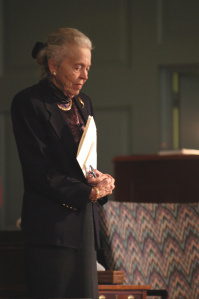 “Our vision is so limited we can hardly imagine a love that does not show itself in protection from suffering. The love of God is of a different nature altogether. It does not hate tragedy. It never denies reality. It stands in the very teeth of suffering. The love of God did not protect His own Son. The cross was the proof of His love – that He gave that Son, that He let Him go to Calvary’s cross, though “legions of angels” might have rescued Him. He will not necessarily protect us – not from anything it takes to make us like His Son. A lot of hammering and chiseling and purifying by fire will have to go into the process.”
“Our vision is so limited we can hardly imagine a love that does not show itself in protection from suffering. The love of God is of a different nature altogether. It does not hate tragedy. It never denies reality. It stands in the very teeth of suffering. The love of God did not protect His own Son. The cross was the proof of His love – that He gave that Son, that He let Him go to Calvary’s cross, though “legions of angels” might have rescued Him. He will not necessarily protect us – not from anything it takes to make us like His Son. A lot of hammering and chiseling and purifying by fire will have to go into the process.”


May 20, 2014
Meriam Ibrahim Update
“God is most glorified in us when we are most satisfied in Him.” John Piper
As we continue praying for Meriam to experience true justice and for the Sudanese government to do the right thing (according to international law and their own constitution) and release her, we should be praying that God would continue comforting this young woman, and helping her to find her satisfaction in Him, first and foremost. I can’t begin to imagine what this poor woman is experiencing, but I know that if she is finding her delight in Him, she can overcome.
That being said, please continue to pray for Meriam’s immediate and unconditional release, and continue to spread the word about what she’s experiencing at the hands of these so-called men of justice.
Here is some new information:
According to Fox News, Meriam’s husband Daniel Wani is in Khartoum working to try and appeal the ruling from Thursday, that sentenced Meriam to death for apostasy. Daniel was able to visit Meriam for the first time on Monday, and found that his eight-month pregnant wife was being kept with shackles on her legs. [Class-act move, Sudan - shackling a very pregnant woman. Do you really think she's going to run away?]
Also, the pressure coming from all over the world might be starting to affect the way authorities in Sudan are approaching this case. Fox reports:
In addition, a statement from several attorneys associated with the Sudanese high court was released Monday, calling for an appeal of Ibrahim’s death sentence.
Another bit of information that has been revealed is that Meriam first came to the attention of authorities back in August, and it was because of members of her own father’s classy family. They apparently complained to authorities that Meriam had been originally named “Afdal” (which is a Muslim name – which meant that she had been born Muslim) and that she had converted to Christianity and married a Christian man, and was therefore committing both adultery and apostasy.
She is in this situation because of her own family – on her father’s side – which is the side that truly “matters” to these so-called men of justice in Sudan.
So, let’s be praying for Meriam – that God would be continually revealing Himself to her in her captivity, and that He – through the Holy Spirit – would influence the authorities to release Meriam and allow her to live.
Finally, you can click here to sign a petition demanding that the Sudanese government release Meriam from prison.
#prayformeriam


May 15, 2014
Please Pray for Meriam Yahia Ibrahim in Sudan
Reports are flying around the internet about a 27 year old pregnant young woman in Sudan who yesterday was sentenced to 100 lashes for the crime of adultery and death by hanging for the crime of apostasy by the judge at the Public Order Court in El Haj Yousif Khartoum.
Meriam was condemned for adultery, because she is married to a Christian man, and Sharia law doesn’t recognize marriage between a Muslim and a person of another religion. The death sentence was given for apostosy because she refuses to recant her Christian faith and convert to (or “return to”) Islam.

Building of the Supreme Court in Khartoum (photo Elaph)
One report documents that Meriam, eight months pregnant, stood before the court yesterday and calmly told the judge, “I am a Christian and I never committed apostasy.” In response, the judge handed down the sentence of death.
BBC reports: “We gave you three days to recant but you insist on not returning to Islam. I sentence you to be hanged to death,” the judge told the woman, AFP reports.
According to multiple websites, Meriam Yahia Ibrahim’s father was Muslim, and her mother was Ethiopian Orthodox Christian. According to Sharia law, this means that Meriam is recognized as Muslim. However, since Meriam’s father left them when she was six years old, her mother raised her as a Christian. Now she faces death for the only faith she has ever known.
And it’s 2014.
And Meriam’s situation makes most of our problems seem pretty petty and small, too.
I’m not sure what the internet can do to help this courageous woman, but I’m certain that praying for her is a good start, and helping to spread the word. Please share this story with your friends on whatever social media you use (#prayformeriam), and remember Meriam Yahia Ibrahim and her family in your prayers.
Also, Meriam’s husband is an American citizen, and he had been trying to get her to America when she was arrested. If you are an American, contact your congressman or representative, and request that they also do something to put pressure on the Sudanese government. This woman is the wife of an American, and should be protected by the United States.
Sources:


Mom’s Not Dead, for Real! The Movie
FAITH BASED FILM OF 2014 COMING THIS SUMMER!
“Mom’s Not Dead for Real”
Kendrick, an older bearded student studying philosophy at Reed College, has a vivid dream one night that heaven is for real. When he wakes up, his wicked professor, Dr. Hercules, mocks his beard and his dream, telling him that his mom, Debra, had gone out with some friends the previous night and died… and NOT gone to heaven.
Of course, the pure-hearted Kendrick refuses to believe it, and sets off on a hero’s journey to find her. Using information from the snakeskin given to him by his uncle Hannibal, Kendrick builds an ark, and as he, Trace Adkins, and Hermione Granger sail off to find his mom, wacky hijinks ensue.
Will Kendrick be courageous enough to face the group of fireproof rock giants who have taken his mom, or run the risk that she could be left behind in a shack… forever?
—
With apologies to Angela Nasfell, the Kendrick Brothers, Russell Crowe, the Burpo family, Sir Anthony Hopkins, Emma Watson, Kevin Sorbo, Patricia Heaton, Michael W. Smith, Darren Aronofsky, and all the other people who could somehow be connected back to this bit of silliness.
Should have been writing, but did this instead.


Replying to Some “What’s Wrong with Christian Filmmaking” Questions
Over on faithwriters.com, someone linked to the article, “What’s Wrong with Christian Filmmaking”. A poster there named Lillian raised some issues with my blog, and I thought I would address them here, in case anyone is interested.
My original points are in italics, Lillian’s responses are in bold, and my replies are using a normal font.
1) We need to permit our artists (writers, actors, musicians, filmmakers) to take more risks. And artists, whether you are permitted or not, take more risks. Did you really get into your artistic field because you liked playing it safe? Why play it safe with the most important thing you have to say?
Some artists need no permission to “play it safe.” They prefer it that way. Every Christian artist should feel free to create as per their convictions. To imply that one is less of an artist or flawed in some way because they don’t take “risks” according to this author’s belief is troublesome to me.
Perhaps I wasn’t clear enough in my article. My intention wasn’t that we should require all artists of faith to take risks. Rather, I was attempting to challenge the church to allow her artists to take risks – as per their convictions.
2) We need to encourage our artists to challenge rather than stroke our sensibilities. A pearl is made when dirt is irritated inside the oyster, after all. And so artists, don’t wait for permission. Start challenging your audience. They will undoubtedly resist you, but we need to be challenged or we’ll stagnate and fade away into irrelevance.
And yet, among the most sold books world wide last year and on the Times bestseller books for months was “Killing Jesus.” Irrelevance? Not as long as God has something to say about it.
First, God is sovereign, and just like He used Balaam’s donkey, He can and will use our attempts to create art in surprising ways. But you have to admit that if we will stagnate if we only expose ourselves to things with which we agree. Nobody outside our little subculture will care what we do as artists, because we’ll be so out of touch.
Before anyone suggests that I’m suggesting that we watch hard R-rated films for the sake of exposure. That’s not at all what I mean. Let me use the Noah film to help clarify my point.
I read testimonies by many Christians who said that they would not see the movie for a variety of reasons, based on what they’d heard:
• The director is an atheist.
• It’s a pro-environment movie.
• The film has rock people.
• The animals didn’t enter the ark two by two.
• Noah has a mental breakdown on the ark.
• Noah gets drunk.
Basically, these people were choosing to avoid having their interpretations of the Noah story challenged. To be honest, I have a great deal more respect for the Christians who saw the film and hated it, and complained about it afterward, because they were at least open to seeing another point of view.
This brings me back to my point. If we don’t like the way people outside the church challenge us, then we should take the reins and challenge each other with the art we produce, à la Proverbs 27:17. Most Christian films don’t do this because the people who make those films are too busy trying to please their core audience (understandably), who largely wish to be stroked and not challenged. It is my contention that filmmakers/storytellers should be freed up to say things that make us uncomfortable, and if the church doesn’t give them permission, they need to be say those things anyway.
Like a prophet.
This makes me think of a favorite story about Rich Mullins speaking to the chapel service at Wheaton College, as told by Shane Claiborne in his book, The Irresistible Revolution. Shane reports that Rich said:
“You guys are all into that born again thing, which is great. We do need to be born again, since Jesus said that to a guy named Nicodemus. But if you tell me I have to be born again to enter the kingdom of God, I can tell you that you just have to sell everything you have and give it to the poor, because Jesus said that to one guy too…[And he paused in the awkward silence.] But I guess that’s why God invented highlighters, so we can highlight the parts we like and ignore the rest.”
3) We need to recognize that art is art, the pulpit is the pulpit, and while the two might cross paths from time to time, they are completely different animals.
They are as per the secular world, but for the Christian artist, should they be? What happened to being “light,” “salt,” “being in not of,” and “examples” not “carbon copies,” leading not following.
Yes, yes, yes! A thousand times yes! Of course they should be different! After all…
The pulpit is the place where Scripture should be explained and the Message delivered clearly, without ambiguity.
Art is inevitably ambiguous, depending on the eyes or ears of the beholder to discover the meaning for him or herself.
The pulpit is the embodiment of “tell, don’t show.”
Art is the embodiment of “show, don’t tell.”
In the pulpit, the personality of the preacher shouldn’t matter, because the message is paramount. In fact, if people are more excited about the messenger than the message, then that group may have a problem.
In art, the personality of the artist might be sole the reason for the excitement for the art, and this doesn’t need to detract from the art.
In my original article, I conceded that the two may cross paths from time to time, but that should be the exception, not the rule. I might want to see that guy who paints upside down pictures of Christ on a special Sunday morning, but I don’t want him up front every week (this is a problem I have with some modern worship – but that’s the subject of another article). At the same time, maybe a piece of art will sometimes be on the nose for effect, but if it is a regular occurrence, it will get shut down by those who aren’t into the message being proclaimed.
So, yes. They should be different.
As to Christians setting the example, I would say that is the job of every Christian in every situation. Sometimes we set the example by explicitly sharing our faith; sometimes we set the example by quietly helping someone in need.
This goes for everyone. Does everyone truly understand this? With all the recent criticisms of Noah because it “is unbiblical”, I have to think that lots of people don’t.
Why would an admitted atheist want to take a biblical story and turn it into a non-biblical film? Could it be that Hollywood has discovered a new way to make money by exploiting the Bible without embracing it?
I have to admit before responding to this that I have still been unable to see Noah, because I live in China, and it’s not showing here because it is a film based on a Bible story. That being said, I’d love to know why you consider the film to be “non-biblical”?
Meanwhile, I’ll ask – are these randomly Googled other examples of Noah biblical?
http://www.daniellesplace.com/html/bible_themes_noah.html
http://www.artistichandsoffaith.com/?p=917
http://www.dltk-bible.com/arks.htm
http://www.freehomeschooldeals.com/free-printables-for-kids-noahs-ark-coloring-pages/
4) We need to be okay with movies that don’t give all the answers.
Says who? Why should we have to be “okay” with it? The overriding stamp of approval is whether we feel God is “okay” with it. I’m still a proponent of God’s opinion rather than man’s.
Re-read my quote and tell me where I said that God’s opinion is not important. Then re-read your quote and see where you wrote that it’s based on what we feel. I would – rather – posit that our okayness with ambiguity should be based on what Scripture teaches. Specifically, look at the teaching style of Jesus. To the masses, he often told stories that the people didn’t get, and they would walk away scratching their heads. Even the disciples, his closest mates, would come up to him afterwards and ask him to explain himself. As Eugene Peterson wrote, Christ was often subversive in the things that he taught. A lost coin? Virgins waiting at the gate? A man beat up on the road? What do these things have to do with God?
And still today, life is often filled with unanswered questions. Why did five-year-old Ben Sauer just die from a rare form of cancer? Why did nearly three hundred miners just get killed in an accident in Turkey? Why did the job I was counting on for next year get suddenly taken away from me?
God has given us lives filled with ambiguity. Maybe, just maybe he has done this so that we will turn to Him for an explanation, like the disciples did. And if no explanation is offered, maybe he is helping us learn to trust His goodness in the face of the ambiguity.
If they succeed in asking some good, deep questions, they might actually open the doors to conversations where answers can be explored.
The Bible is not only to be explored, as if it’s in some artistic laboratory, but accepted. Anything that doesn’t lead to that end is mere entertainment. Entertainment is fine, but let’s not confuse it with trying to communicate truth.
First, how can you accept what the Bible teaches if you don’t explore it?
Second, are you suggesting that the only satisfactory end to truthful art made by Christians is that the Bible be accepted? This is confusing to me, because I’m not really even sure what it means to “accept the Bible.”
If – by that phrase – you mean accept that the Bible is God’s word, then I would say that art can help bring a person to this place, but it will typically not do it by itself.
If – by that phrase – you mean accept Jesus as their Lord and Savior, then I would say that the phrase is not a biblical phrase anyway, so it would be irrelevant.
If – by that phrase – you mean accept the core message of the Bible – the Gospel – that God made us and loves us; that our sin has condemned us; that we are separated from Him; that Jesus came and died on the cross to pay our debt and restore the relationship between humanity and God; that we must believe that Jesus was who he said he was, repent of our sins, and receive Jesus’s forgiveness and salvation… so you’re suggesting that all art made by Christians has to end with a call to salvation? Or is it possible that an artist can communicate this message in a subtle way so that a non-believer is willing to be exposed to it, and when they watch/read/hear the story, the Holy Spirit has some room to start pricking the heart?
See, to me, this is the power of art made by people of faith – when well crafted, it has the power to slip past defenses and lay out the truth behind enemy lines. And the art might just need to be entertaining to accomplish this. It might not have a clear gospel call as a part of the entertaining, but it doesn’t change the fact that can still impact, just like the stories of Jesus did.
Artists, isn’t part of our job to provoke questions? Don’t feel you have to end every sentence with a period.
No, but we need be tolerant of everyone’s point of view and preferences. And in spite of my comments, I respect this author’s right to express his opinion.
I appreciate that, and right back at you.
5) Jesus wasn’t known for telling mediocre stories that ticked off all the correct religious boxes. He was known for telling compelling stories that challenged his listeners while communicating God’s truth. Aren’t we supposed to be like Jesus?
Yes, we’re suppose to “communicate God’s truth, not that of a secularist/atheist. I haven’t seen it, but I was wondering, should I decide to see it, will I find any of “God’s truth” there?
Considering that all truth is God’s truth, I believe that you will. And again, if God used Balaam’s donkey, why can’t he use Aronofsky’s filmmaking skills? Of course, I believe it would be helpful to leave your own traditions and personal interpretations of the Noah story at the door before you walk into the theater to watch. Christians don’t own the story of Noah, after all.
I just hope we can figure out how to tell The Story – truly the Greatest Story Ever Told – in the manner in which it deserves, and in such an excellent way that people outside the Christian subculture will receive it.
Can you find the “Greatest Story Ever Told” in the film in question? And why do we need to “figure out a way to tell the story? The blueprint has worked ever since Jesus told His disciples what to do and how to do it. I need to be convinced that relevancy is the answer to rebellion and apathy.
Again, I haven’t seen Noah yet, so I can’t say. As to why we need to “figure out a way to tell the story”? We need to figure it out because the world needs so desperately to hear it. There is a time for using the clear language of the pulpit, but God isn’t limited to communicating His truth through that venue. He can use a novel, a screenplay, a piece of sculpture, a painting, a piano concerto, photography, poetry, 3-D art, and yes… even mime.
And why is relevancy such a dirty word? Especially in this situation, I would equate relevant with excellence. An excellently told story will – by virtue of its excellence – be relevant. And we, as Christian artists, should strive for excellence – and therefore relevance – in every single piece of art that we produce. Because the goal of what we are creating should be to whisper, sing, cry, laugh, or shout out God’s glory for everyone to see.


May 12, 2014
A Hard Word from John Piper
A good word to Christians trying to “make it” as artists, writers, actors, singers…
God is most glorified in you when you are most satisfied in Him.
Definitely worth the 2:48 it will take to watch. And then take another ten seconds and share!


May 10, 2014
An Open Letter to Readers of Thimblerig’s Ark
Dear Reader,
First of all, thank you so much for reading Thimblerig’s Ark! I hope that you enjoyed it.
 I had so much fun creating the character of Thimblerig, and making him truly despicable so that we could be surprised when we wind up rooting for him. Apparently others liked him, too, because many readers have written me asking what happens to him next! Well, if you are one of those readers, don’t go far, because Thimblerig’s saga isn’t over yet. He and the other members of the company will be back for Thimblerig’s Ark, Book Two.
I had so much fun creating the character of Thimblerig, and making him truly despicable so that we could be surprised when we wind up rooting for him. Apparently others liked him, too, because many readers have written me asking what happens to him next! Well, if you are one of those readers, don’t go far, because Thimblerig’s saga isn’t over yet. He and the other members of the company will be back for Thimblerig’s Ark, Book Two.
I really have appreciated the feedback I’ve received, at Amazon, on Goodreads, at my blog, and through private messages. And one of the things that I’ve discovered in this process is that I really do enjoy feedback! As I have just started diving into the second book, I would really enjoy hearing what you liked, what you loved, even what you hated. In short, I’d love to hear from you! You can reach me at info@thimblerigsark.com or the website, www.thimblerigsark.com.
Finally, I need to make a request. I’d love to have you review Thimblerig’s Ark. Was there something that you found meaningful? Did you love it? Did you hate it? Some people are thrown off by the idea of writing a review, but this extremely low pressure. It can be a couple of sentences, or a few paragraphs. Either way, I would really appreciate your feedback.
It’s really difficult to get reviews, because folks are all busy and it takes enough time to read a book, let alone the time it takes to craft a comment. But the truth of the matter is that you – the reader – have the power these days to make or break a book. And I would love your help!
You can write your review on Thimblerig’s Ark Amazon page here: http://amzn.to/1sfGN8G
And/or at Goodreads here: http://bit.ly/1l5qgR1
I really am grateful that you read Thimblerig’s Ark, and hope you’ll be around for the second part in a few months!
And if you haven’t read Thimblerig’s Ark yet, what are you waiting for? A flood?
Sincerely
Nate Fleming
And special thanks to thefutureofink.com for the idea.


May 7, 2014
The Redemption of Eustace Scrubb

Art by Jonathan Mayer
I just took my fifth grade students for a voyage on the Dawn Treader, and I have to confess something that might be shocking to those who are familiar with what I consider to be the best book in the series.
I love Eustace Scrubb.
Yes, he is irritating, shrill, mean-spirited, spiteful, and if I had I had a student like Scrubb in my fifth grade class, I would likely duct-tape him to the wall even if it cost me my job. He might just be the most infuriating young character in all of children’s literature, but God help me, I love the kid, and have for a long time.
There. I’ve said it, and I feel better.
There was a boy called Eustace Clarence Scrubb, and he almost deserved it. His parents called him Eustace Clarence and his masters called Scrubb. I can’t tell you how his friends spoke to him, for he had none.
C.S. Lewis opens the novel by rapping us on the forehead and firmly saying, “You must not like this boy!” just in case we have any inclination to give Scrubb the benefit of the doubt. Lewis then goes on to paint a picture of just how bloody awful the kid is.
First, Scrubb is horrible to our two favorite Pevensies: the ever-patient Lucy and the just-barely-not-irritating-himself Edmund. He teases them about their talk of Narnia that he believes to be make-believe, and Lewis holds nothing back, telling us that Scrubb “was far too stupid to make anything up himself.” (I love it, Clive! Love it!)
 Second, Scrubb disrespects the ‘cheep. Reepicheep, among the most beloved of all the Narnian characters, one of the last characters you would want to disrespect, and Scrubb thinks it a funny idea to grab the mouse by the tail and swing him about like a rag doll. Of course, Reepicheep quickly and effectively lets the boy know that he is not a mouse to be trifled with, but the damage to his honor was already done.
Second, Scrubb disrespects the ‘cheep. Reepicheep, among the most beloved of all the Narnian characters, one of the last characters you would want to disrespect, and Scrubb thinks it a funny idea to grab the mouse by the tail and swing him about like a rag doll. Of course, Reepicheep quickly and effectively lets the boy know that he is not a mouse to be trifled with, but the damage to his honor was already done.
And the list of irritants grows. Scrubb can’t be given away at a slave market because of his complaining, he constantly grumbles about the lack of a British Consul in Narnia, he keeps the whiniest diary in the history of diaries, he attempts to steal from the ship’s water supplies, and he calls the King of Narnia an idiot.
Despicable. The kid is absolutely despicable. And yet he is one of my favorites. Am I pathetic? Do I just have bad taste in literary characters? Does insanity run in my family?
To understand why I’m so drawn to Eustace Scrubb, you have to understand Narnia. And to understand Narnia, you have to attempt to understand the Creator of Narnia, and I don’t mean Clive Staples. Of course, I’m referring to the lion. The great lion. The King of the Beasts, and the real ruler of Narnia.

“Aslan and Lucy” by Justin Sweet
Aslan.
Does the name bring out some emotion when you read it? It does for me, which is surprising, because it’s just a name, and a name of a fictional character at that. But the name represents someone so incredibly wonderful that when I read it – it brings out a mixture of hope, joy, and awe.
 Aslan created Narnia, as we read about in The Magician’s Nephew, the first book in the series (chronologically), and so everything in the country obeys him, and plays by his rules. Reading the series, you find that his influence doesn’t end at Narnia’s borders, but extends into our own world, where he can choose to bring people to Narnia.
Aslan created Narnia, as we read about in The Magician’s Nephew, the first book in the series (chronologically), and so everything in the country obeys him, and plays by his rules. Reading the series, you find that his influence doesn’t end at Narnia’s borders, but extends into our own world, where he can choose to bring people to Narnia.
I wonder how many people (children and adults alike) have wished to be transported from our world to Narnia in the 64 years since the first book was published? Millions, I would guess. I know I have. I’ve spent countless hours sitting in front of wardrobes longing for the back to open up and allow me passage. A student at my school painted a picture of a ship at sea and each time I pass the picture, I imagine it flooding the hallways with water and sucking me into the Great Eastern Ocean.
 But here’s the thing. I can stare all day at the wardrobe, and touch the painting longing for wetness, and it won’t matter. We can wish all we want, but the only way we would ever be brought to Narnia would be if it were Aslan’s will.
But here’s the thing. I can stare all day at the wardrobe, and touch the painting longing for wetness, and it won’t matter. We can wish all we want, but the only way we would ever be brought to Narnia would be if it were Aslan’s will.
And this brings me back to Eustace Scrubb, and the question that is raised when you consider his awfulness. Why in the world would Aslan will for such a beastly boy to be brought into the country that he created? The answer is surprisingly simple.
Aslan brought Eustace into Narnia so that Eustace could come to know him, and in coming to know him in Narnia, he could also come to know him back in our world.
“It isn’t Narnia, you know,” sobbed Lucy. “It’s you. We shan’t meet you there. And how can we live, never meeting you?”
“But you shall meet me, dear one,” said Aslan.
“Are -are you there too, Sir?” said Edmund.
“I am,” said Aslan. “But there I have another name. You must learn to know me by that name. This was the very reason why you were brought to Narnia, that by knowing me here for a little, you may know me better there.”
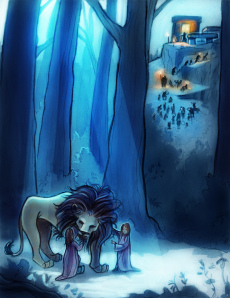
Comfort Before The Sacrifice by Nicholas Jackson
And as we see time and again in the Chronicles, you can’t know the Great Lion without being changed for the better. Even the White Witch, in The Lion, the Witch and the Wardrobe is afraid to be in the same place as Aslan without having him tied down and completely submissive, which could only happen if Aslan permitted it to happen, and even then she fools herself into thinking that she is in control of the situation.
But what about Scrubb? He’d heard about Aslan while on the Dawn Treader, but had hated the name, as he’d hated everything that was happening to him from the moment he’d been sucked in through the picture on his bedroom wall.
But he had been sucked in for a reason – to know Aslan.
As a boy, Eustace burned people with his words and his bad attitude, and so Aslan permitted him to be transformed into a literal beast, because really, that’s what he was anyway. What was the purpose? Because Eustace needed to see himself for what he really was, so that he could see his need for change, and see that he was incapable of changing on his own.
And this is it – the crux of the matter – and why I love the character so much. Because Eustace is me. I am him. We are one and the same. If you peel away my skin and get a good look at what lies just beneath the surface, you’ll see pure unadulterated ugliness. Dig in deep and you’ll find that greed, lust, selfishness, drunkenness, ignorance, laziness, unfaithfulness, will all come oozing out from the deepest and darkest parts of my being.
Dig in deep and you’ll see that I am a person in desperate need of Narnia.
 I don’t need Narnia because it would be cool to see a faun or a giant. I don’t need Narnia because it’s a place untouched by modernity and technology. I don’t need Narnia because it would help me return me to magic and hope, as the movie adverts say.
I don’t need Narnia because it would be cool to see a faun or a giant. I don’t need Narnia because it’s a place untouched by modernity and technology. I don’t need Narnia because it would help me return me to magic and hope, as the movie adverts say.
I need Narnia because I need the one who will look past all of my mistakes and pay more attention to my potential. I need Narnia because I need the one who will care enough about me to allow me experience adversity, pain, and conflict so that I will remember that I need him. I need Narnia because I need the one who is willing to undergo humiliation and suffering to make certain that I don’t have to, and who does it because of his love for me.
In short, like Eustace, I need Aslan.
Like Eustace, like Edmund, like Peter, like Susan, like Diggory, like Jill, like Caspian, like Mr. Tumnus, like the Beavers, like Reepicheep, like Polly, like Tirian, like Trumpkin, like Frank, like Strawberry, like Helen, like Puddleglum, like Prince Rillian, like Puddleglum, like Lucy, and a whole host of others…
I need Aslan.
And so I love Eustace Scrubb. I love him because I see myself in him so very clearly. I love him because he represents the hope in me that although I am so very flawed, there is someone who loves me in spite of myself. There is someone who wants to make certain that I don’t remain flawed, but that I draw closer to him, so that I can become more like him.
And with all due respect to Mr. Liam Neeson, the name of Aslan – the name of the one who C.S. Lewis was hoping that we would find when we returned from our adventures in Narnia with the great lion – that name is not up for grabs.


May 4, 2014
The Writing Process Blog Tour
Mark Lingane from mark-mywords.co, an old friend from Kazakhstan and author of several books including The Tesla series, Beyond Belief, Chasing Heart and Desert Heart invited me to be a part of a Writing Process Blog Tour, and I am excited to take part in this – my first blog tour. As a part of this experience, I was asked to answer four questions that might help bring insight to my writing process. So, hold on tight! Here we go:
1. What am I working on?
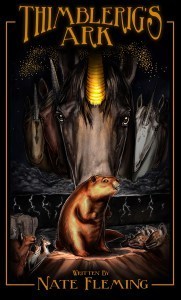 I’ve got two books in the works right now. The first book is the second book in my Thimblerig series, which tells of the further adventures of Thimblerig the groundhog and his friends. I can’t really say much more about that, because I don’t want to spoil the end of Thimblerig’s Ark. I’m also just in the planning stages of a family adventure novel that follows an expatriate family in the Southeast Asia as they stumble on a trail of clues that may lead to fabulous treasure, but could also lead to certain doom. This is a book that I also plan to turn into a series.
I’ve got two books in the works right now. The first book is the second book in my Thimblerig series, which tells of the further adventures of Thimblerig the groundhog and his friends. I can’t really say much more about that, because I don’t want to spoil the end of Thimblerig’s Ark. I’m also just in the planning stages of a family adventure novel that follows an expatriate family in the Southeast Asia as they stumble on a trail of clues that may lead to fabulous treasure, but could also lead to certain doom. This is a book that I also plan to turn into a series.
2. How does my work differ from others of its genre?
I am a writer from a Christian background who loves writing for kids and who is trying to avoid writing so-called “Christian” books. While writing Thimblerig’s Ark, I had a little set of rules that I kept on a post-it note in front of me all the time to help keep me from falling into the “Christian writing” trap.
So, if my genre is kid-oriented and remotely “faith-based”, then I hope that I bust that genre wide open by being a good storyteller who happens to prioritize faith in my life, rather than a person trying to use writing as a way of proselytizing. Hey! Proselytizing! That could have been my fifth P!
3. Why do I write what I do?
It might be because I have three kids of my own, or it might be because my day job is teaching upper elementary in an international school, or it could be because I’m a ten year old boy trapped in a mid-40′s body. Whichever one (or all) of those which might be true, the books on my list of favorites are almost all books written for the 10 to 14 year old crowd. Therefore, I write what I love.
And my ambition for what I write is not small, because I want to write the books that adults will look back on in twenty years as being Important Books For Their Childhood. By this I mean that I want people to remember my books the way I remember Narnia, or Edgar Rice Burroughs, or Lloyd Alexander.
Why bother dreaming if you aren’t going to dream big?
4. How does my writing process work?
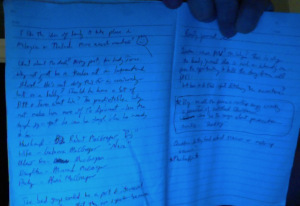 Ha! Considering that I am a father of three, a husband of one, a full-time teacher living in China, a drama/theater director, and I need to eat and sleep – writing comes when it comes, and how it comes. I always carry around a little notebook, so that when inspiration hits, I can drop everything and scribble it down. Hopefully it doesn’t happen while I’m holding the baby, but inspiration could hit while I’m riding on the bus, during my lunch break at school, even during church. Actually, some of my best ideas have come during church.
Ha! Considering that I am a father of three, a husband of one, a full-time teacher living in China, a drama/theater director, and I need to eat and sleep – writing comes when it comes, and how it comes. I always carry around a little notebook, so that when inspiration hits, I can drop everything and scribble it down. Hopefully it doesn’t happen while I’m holding the baby, but inspiration could hit while I’m riding on the bus, during my lunch break at school, even during church. Actually, some of my best ideas have come during church.
Writing typically happens at ten minute increments – when I have the time – or like right now – late at night when everyone has gone to bed and the house is quiet. It might be that my wife generously gives me permission to take Saturday morning and go sit in a coffee shop by myself, or I could find myself sitting in my classroom after school pounding away. It rarely happens at home, as I have a very difficult time writing at home. This is probably because I don’t have a dedicated writing spot at home away from the hustle and bustle of the family. My dream home includes a wood-paneled room, lined with bookshelves filled with books, and with a view of the sea, where I can close myself off from the rest of the world to sit and write.
 And I write to music. This is a non-negotiable aspect to my process. Specifically, I write to movie soundtracks. When I was working on Thimblerig’s Ark, I had a Spotify playlist that included Hans Zimmer and Thomas Newman, with Man of Steel, Inception, and Cinderella Man being favorites on my rotation. I’ve been told the book has a real cinematic feel to it, and if that is true then I’m certain that the mood produced by the music on that soundtrack playlist helped me to produce something that turned out to be filmic.
And I write to music. This is a non-negotiable aspect to my process. Specifically, I write to movie soundtracks. When I was working on Thimblerig’s Ark, I had a Spotify playlist that included Hans Zimmer and Thomas Newman, with Man of Steel, Inception, and Cinderella Man being favorites on my rotation. I’ve been told the book has a real cinematic feel to it, and if that is true then I’m certain that the mood produced by the music on that soundtrack playlist helped me to produce something that turned out to be filmic.
So, that’s me. Next up, I’ve tagged China-based South African fantasy writer Jaco van Wyk to share his process – that will be up on May 12. I will put up a bit more about Jaco in the days to come, including the link to his blog.

Jaco van Wyk





